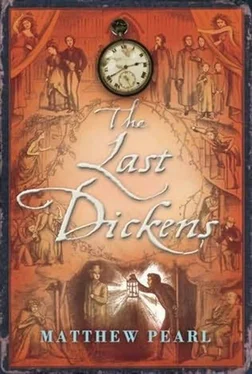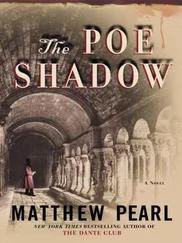“When have you ever not, Chief?” asked his manager, indignant on his behalf.
“I swore to myself never to return to America again. There can only be bad things from coming here.” The last time Dickens had come, in 1842, he had planted himself in the middle of a public row by calling for American publishers to adopt international copyright law to stop the free reproduction of British books. Dickens was called greedy and mercenary and accused of coming to the country only to increase his wealth.
His manager now tried to placate the Chief by speaking in generous detail of the first ticket sale and of their great prospects. “Line two miles away from the ticccket boox! ” Dolby had long ago conquered a fussy stammer, but still there always seemed a rock in the path of his speech that he had to take care not to stumble over. To master it he had formed a strange habit: he would enunciate the most mundane word with the elaborateness of a regal pronouncement. Cash, telegraphic , and ticket box sounded Shakespearean coming out of Dolby's prominent jowls.
“Look at these,” Dolby said. He removed several bundles as big as sofa cushions.
Dickens sucked in his tongue. “Surely that must be the family wash,” he said.
“Our receipts, just from the first series! Mr. Kelly and I will begin wiring the money to Coutts in London in the morning.” Dickens weighed a pile in each hand as Dolby spoke. “Remember, Chief, seven dollars to the pound.”
Dickens said, “I knew you would see to it that the ticket sales were a slap-up success, good friend. Of that I never doubt.”
“You shall have plenty of peace. See that door over there? It's a private stairs in the rear of the hotel so you needn't be among the public when you don't wish it.”
“Surely, surely. Hot and cold bath, too,” Dickens commented as he wandered again, impressed at the well-appointed rooms and the brilliant flowers left there by Annie Fields that he now ran under his nose. “Now Dolby, be sure to convert those greenbacks directly into gold. Don't ever trust American currency.”
“Never would, Chief!”
After bathing, Dickens took his seat at his desk. He removed his writing case, which held a variety of pencils and quill pens. He had a small red leather diary that he opened to a page toward the back to study it. Plucking up one of the many feathered writing instruments, he then sought out the inkwell provided by the hotel. Wetting the tip of the pen until it soaked black, he proceeded to compose a brief message. “Dolby,” Dickens said, folding the paper when he was done, “have this brought to the telegraph office, won't you? It is important.” Dolby opened the door and snapped his fingers to call for Tom Branagan.

TOM BRANAGAN FELT THE MANAGER'S EYES LINGER ON HIM AP-provingly as he exited room 338 on his latest mission. Downstairs in the Parker's office, the telegraph operator adjusted his eyeglasses and held up the piece of paper to the lamp.
“From Mr. Dickens. ‘Safe and well, expect good letter full of hope.’ Is that all?” the operator asked, squinting as he read the cramped writing. The operator seemed disappointed to find no more sensational message to transmit from the world's most famous writer. “I suppose you came all the way from dear old England to carry scraps of blotted paper up and down the stairs.”
“Thank you for your help. Good evening,” replied Branagan evenly.
As Branagan crossed through the loud barroom and climbed back to the third floor, he was thinking about quiet conversations he had overheard between Dickens and Dolby about Nelly Ternan, the young actress who resided back in England, and whether she would also join them in America. Branagan guessed that the seemingly trifling note was a secret way of instructing Miss Ternan, though he did not know whether it meant she should come or not. But Branagan could guess at that, too.
The crowds awaiting Dickens upon their arrival suggested there would be nothing quiet about a twenty-six-year-old actress joining Dickens, the married father of eight grown children whose mother had moved away from the family estate in England ten years earlier. Branagan did not believe Dickens would want the extra scrutiny. No, nothing ever seemed to stay quiet in America, and that had been the disappointment showing in Dickens's face at supper. Through the narrow gap of that open door Charles Dickens had seen the nation as if it were one enormous curious eyeball trained on him.
Tom Branagan was one of the four subordinates in Dickens's camp brought for the tour. The assistants shared two rooms on the same floor as Dickens, whose own spacious rooms adjoined George Dolby's. Tom shared his with Henry Scott, the novelist's dresser and tailor. Henry was the only person-with the exception of Dolby-allowed in Dickens's dressing rooms before and after public readings. Henry, a melancholy man, would dress the novelist and adjust his hair into the perfect image of the younger man seen in so many photos in the windows of so many bookstores: the dashing, carefree genius whose eyes seemed to penetrate through the world around him just like the novels that made him famous.
Henry liked to consider himself in a different class than the other assistants, and when not in Dickens's company would remain reserved. Henry always referred to the Irish porter as “Tom Branagan,” never using just his first or surname. There was also Richard Kelly, a ticket agent with much bluster but a delicate constitution who was still recovering from the rough passage aboard the Cuba. George, the gas man, adjusted the lighting at each theater to Dickens's exacting requirements. Conversation with George was doomed because every time he saw a lighting configuration-such as those in the glowing marble lobby of Parker's-he would stop and mutter to himself a long list of potential improvements.
Tom, at twenty years old, was the youngest of the group. His father, who had immigrated to England from Ireland, had worked for Dolby for ten years as a driver in the town of Ross. Tom's father died after being kicked in the chest by a horse and Dolby, in a fit of compassion, agreed to engage Tom, who needed to help support his elderly mother and two unmarried sisters.
The young fellow was well built, cool, and collected, the right traits for a decent porter. Tom had no mandate as specific as seeing to Dickens's dress, light, or profits. A whistle, a snap of the fingers, a tapped foot-all were signals for Tom to do anything that was needed.
***
NOT EVERYONE APPROVED of the decision to bring Tom to America.
For each of the trusted advisers in England originally consulted in planning Dickens's trip, there had been different notions about what might go wrong in America: Charles Dickens himself had been most worried about the Fenian Brotherhood, the radical Irishmen spread throughout the United States, particularly in Boston and New York, devoted to bringing down ruin upon England. They would relish the opportunity to assault a conspicuous Englishman like himself on American soil. George Dolby, meanwhile, worried about the American speculators ruining ticket sales by buying up excessive numbers of tickets. John Forster, who considered himself Dickens's closest friend and most selfless adviser… well, Mr. Forster worried. He worried that Dickens's presence could inspire anti-English riots like the ones against the Shakespearean actor William Macready in New York. Forster also thought, generally speaking, that it was unseemly for a man as great as Dickens-and in John Forster's eyes no man was greater-to be seen going to such lengths for no grander purpose than making a profit.
Читать дальше













